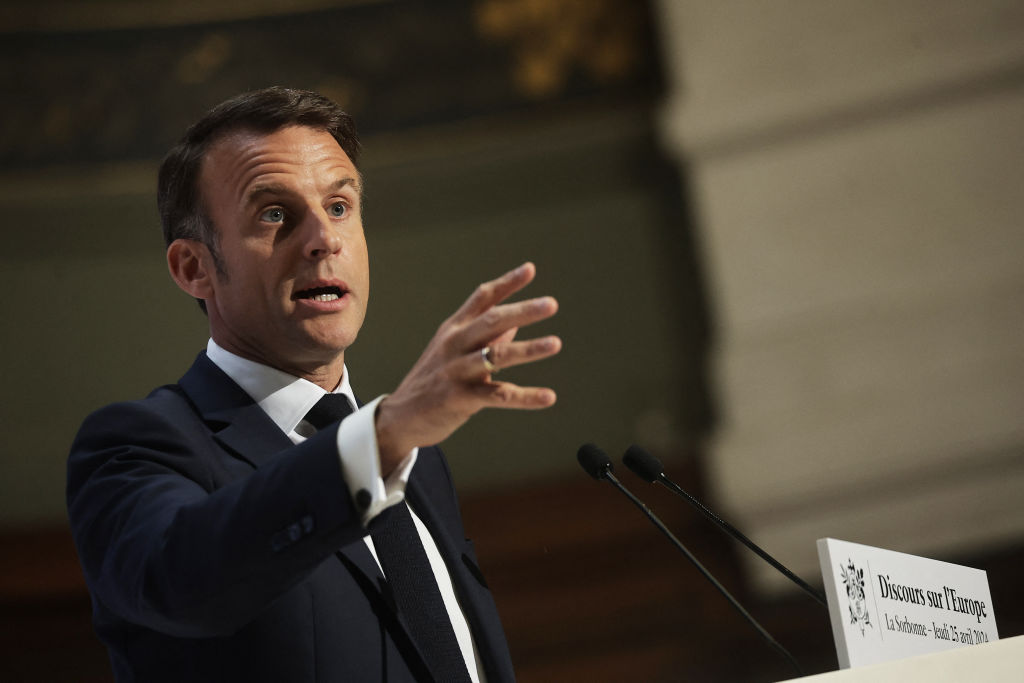The French poet Paul Valery wrote in 1919: “We modern civilizations have learned to recognise that we are mortal like the others.” In the aftermath of a bloody continental war, Valery argued that what we took for granted — European civilisation and nation-states such as France or Russia — could well be wiped out and relegated to the history books as were the Babylonians centuries ago.
Yesterday French President Emmanuel Macron, in his first speech to the Sorbonne University since 2017, channelled his inner Valery: “We must be lucid about the fact that our Europe, today, is mortal. She can die. She can die and it only depends on our choices.”
With war at the EU’s borders and with Europeans incapable of meeting Ukraine’s needs despite its best efforts — France’s annual production of shells would be depleted in less than a week by the Ukrainians, let alone the Russians — Macron shared a much darker speech than his first iteration in 2017.
And while Russia is the current direct threat to Europe’s stability, the French President painted a larger picture of Europe at risk of being relegated far behind China and the United States, two countries mentioned more often than both Russia or Ukraine, if it continues to be a geopolitical playing field rather than an actor in its own right. For him, both countries “have decided to no longer respect the rule of international trade”, especially since America’s Inflation Reduction Act.
Macron has arguably been one of the most far-sighted leaders in Europe with his relentless drive to build the continent’s strategic autonomy. Declaring in 2017 that “this era when Europe bought its energy and fertilisers from Russia, produced in China, delegated its security to the United States of America, is over,” might now sound obvious. However, making that pitch for Europe to think of itself as a strategic actor in its own right seven years ago constituted a strong break with traditional thinking in Europe.
But the issues with Macron’s (very long) speeches are twofold. Firstly, while the President styles himself as a European visionary, he remains the French President first. Yesterday’s speech was also a de facto campaign speech weeks before the European elections to help the flailing campaign of his Renaissance party. Along with his geopolitical commentary, he called for a tax on financial transactions, European preference for defence procurement and the suspension of some competition rules. This is a laundry list of historic French policy goals that will raise serious opposition in European capitals, not least in Berlin.
Secondly, making a rigorous intellectual case for strategic autonomy is one thing, but getting everyone on board is a different matter. Until very recently France had largely overlooked the importance of Central and Eastern Europe in its grand continental vision. Yet, Macron’s repeated calls to integrate Russia into a larger European security architecture, sometimes even after Russia’s invasion of Ukraine, made many of the former Soviet satellite states republics very sceptical of the seriousness of his project.
While there have been policy wins — the €750-billion Covid recovery fund and the creation of a common debt instrument dubbed Europe’s “Hamiltonian moment” are undeniable successes for Macron’s vision for Europe — seven years after the first Sorbonne speech, one could argue that he has been more of a prophet of strategic autonomy than its usher. It was not Macron but Vladimir Putin who made Europeans wake up to their energy dependence on Russia and Covid which made clear Europe’s reliance on Chinese goods.
Yesterday’s speech painted a dark but lucid view of the continent. But it remains to be seen if it will have a serious impact on future European policymaking.











Join the discussion
Join like minded readers that support our journalism by becoming a paid subscriber
To join the discussion in the comments, become a paid subscriber.
Join like minded readers that support our journalism, read unlimited articles and enjoy other subscriber-only benefits.
Subscribe